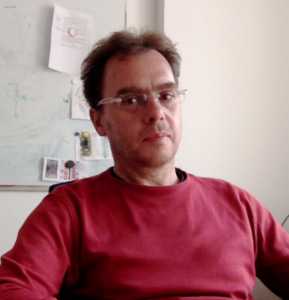Andrea Bonani | December 10, 2018 | 11:00 | B01.0.14
Abstract:
In parallel with the rapid growth of digital technology and its pervasiveness in everyday life, it emerged the need to introduce knowledge of computer science at school, from the early years of the scholastic curriculum. This is not intended to promote programming careers among students, nor because they shall work in areas related to Information Technology, but because already in the present times, and more in the future, aware citizens must have digital skills and competences in order to be fully integrated into our society.
In the last decade Computational Thinking has gained attention as a way for schools to develop those skills required by the current digital age. Algorithmic thinking is at the core of Computational Thinking and tangible interactive solutions can help children develop algorithmic thinking skills.
This talk focusses on exploratory research concerning tangibles for graphs and graph algorithmic thinking (GAT) for learners aged from 9 to 15 years. The purpose of this research is to promote Algorithmic Thinking at school, by means of multi-sensory physical activities and learning-by-doing. Specifically, the research uses inter-connected interactive tangible objects. Manipulating tangibles fosters interplay between abstraction and concreteness, so as to enable learners to learn through visual and tactile experiences.
By following an action research process, interactive objects for GAT evolved through prototyping and actions-studies. The talk overviews their evolution and delves into its most recent action: an ecological study with learners using tangibles for GAT. It ends by reflecting on results and future work.
CV:
 Andrea Bonani is a PhD student at the Faculty of Computer Science, Free University of Bozen-Bolzano. After his graduation from the University of Padua, Italy, he worked as a teacher of Mathematics at the first level of secondary school. Later, he worked for 10 years in the Education Department of the Province of Bozen-Bolzano (Dipartimento Istruzione e Formazione Italiana) as the coordinator of the FUSS project. The FUSS project installed GNU/Linux in all Italian speaking schools of South Tyrol and promoted the use of new technologies among teachers. The focus of his PhD research fits between computer science education and interaction design. In particular, his PhD research is concerned with the design and development of interactive objects for the scaffolding of graphs and graph algorithmic thinking.
Andrea Bonani is a PhD student at the Faculty of Computer Science, Free University of Bozen-Bolzano. After his graduation from the University of Padua, Italy, he worked as a teacher of Mathematics at the first level of secondary school. Later, he worked for 10 years in the Education Department of the Province of Bozen-Bolzano (Dipartimento Istruzione e Formazione Italiana) as the coordinator of the FUSS project. The FUSS project installed GNU/Linux in all Italian speaking schools of South Tyrol and promoted the use of new technologies among teachers. The focus of his PhD research fits between computer science education and interaction design. In particular, his PhD research is concerned with the design and development of interactive objects for the scaffolding of graphs and graph algorithmic thinking.
